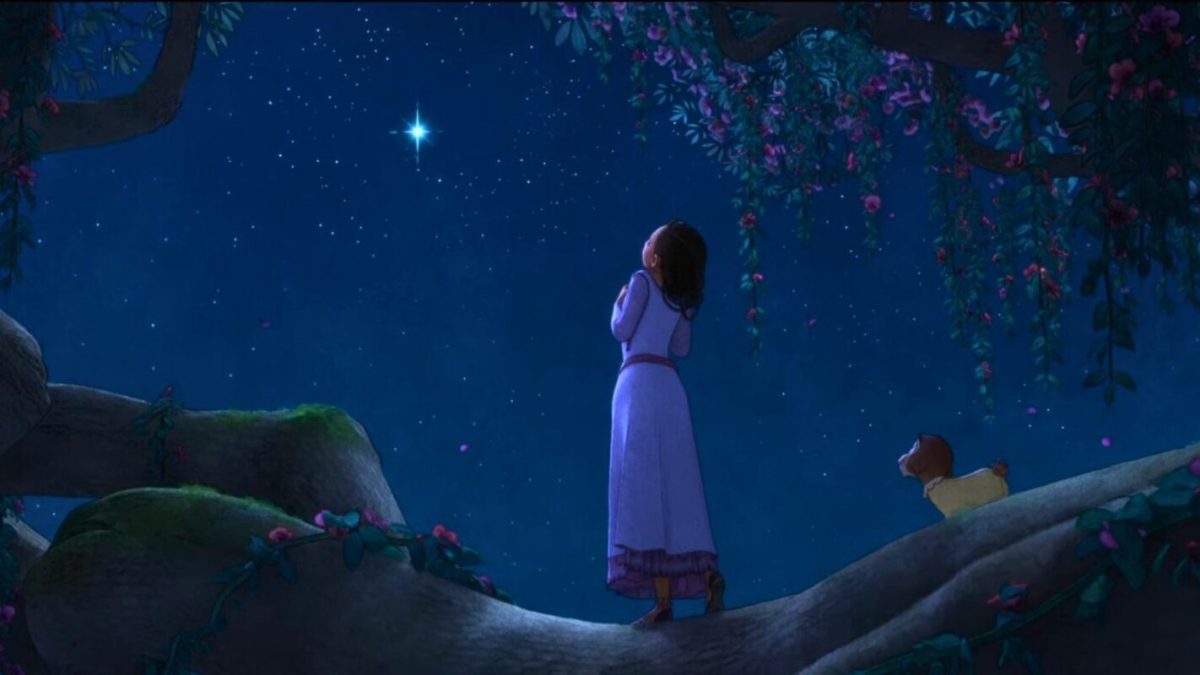“When you are threatened, you don’t breathe. You focus.”
This line is spoken by King Magnifico, the main villain of Disney’s “Wish”. While his words have sinister implications, it also serves as a good metaphor for what Walt Disney Animation Studio’s mission with this film was. In a time when competition is increasing, “Wish” focuses on the core aspects that made Disney animated films great to begin with – magic, princesses, villains and dreams come true – just in time for the company’s 100th anniversary.
“Wish” opened in theaters on Nov. 22. In the weeks since then, it hasn’t impressed at the box office, having only grossed $81 million on a $200 million budget as of Dec. 5. It’s a far cry from the billions the studio made on similar animated films like “Frozen” in the last decade, and the most recent in a string of underperforming films from the company.
The common consensus among critics seems to be that “Wish” just isn’t worthwhile. On review aggregator site Rotten Tomatoes, the film sits at a 48% rating, the first in the studio’s animated canon to fall behind the site’s “fresh” marker since 2005’s “Chicken Little”. While I don’t think “Wish” is the greatest film Disney has made, I disagree with the masses on its quality. It’s an incredibly enjoyable movie that more than satisfies as the studio’s centennial celebration.
What invested me the most in “Wish” was its premise. Throughout much of Disney’s history, the trope of “wishing upon a star” has been prevalent. This film takes that concept and adds a new layer of depth to it. King Magnifico of Rosas keeps the wishes of his citizens locked away in his tower, fearing their potential danger if granted. The film’s protagonist, Asha, disagrees with this notion, feeling that everyone deserves the chance to pursue their wishes on their own accord. The film also explores what wishes mean to us as human beings, questioning if a person can truly be complete without wishes. All of these themes come together for an exciting plot that incorporates elements from all of Disney’s golden age fairy tale films, while also putting those classics in a whole new perspective.
The premise and story are bolstered by the film’s fantastic cast of characters. Asha, voiced by Ariana DeBose, is a fun and relatable protagonist, and her group of friends are a surprisingly fun homage to the Seven Dwarves. Star, a living incarnation of the wishing star, is incredibly cute, with its presence reminding me of the lovable Lumas from Nintendo’s “Super Mario Galaxy.” The show stealer, however, is King Magnifico. While Disney was once known for its rogues’ gallery of delightfully evil villains, its recent films have shied away from them in favor of last-minute twists or stories focusing on generational trauma. Magnifico finally goes back to the roots of classic Disney treachery. Chris Pine gives his all in his portrayal of the narcissistic monarch, creating a character that is both charmingly comical and cunningly malicious at the same time. He’s so fun and memorable that I’d say the film might be worth watching for him alone.
One aspect I did have mixed feelings about was the film’s art style. While most of Disney’s films are unquestionably impressive from a visual standpoint, “Wish” rocks the boat by going for a watercolor aesthetic. Essentially, while the entire film is in 3D, the characters and background are filtered in a way that brings their look closer to earlier 2D animated films. This has been a common trend in recent movies by other studios, like Sony’s two animated Spider-Man films and Dreamwork’s “Puss in Boots: The Last Wish.” Disney’s first attempt at this has yielded interesting results, to say the least. “Wish” looks downright unfinished in many scenes, particularly those set in the daylight. In low-light settings, however, the style flourishes into some of the most beautiful imagery I’ve seen from Disney in a long time. Fortunately, most of the film takes place during the latter, so it wasn’t too bothersome.
The film’s soundtrack was also hit-or-miss. I found many of its songs forgettable, which is disappointing considering the studio’s strong musical legacy. Considering the film does so well in celebrating Disney’s 100th anniversary in other areas, I’m honestly surprised the studio didn’t try harder in this regard. Luckily, there are two stand-out tracks that will likely live alongside the greatest Disney songs: “At All Costs” is a duet between Asha and Magnifico that sounds particularly nice, albeit at the cost of feeling somewhat out of place initially. “This Wish” is the song that forms the movie’s thesis statement, and is a true masterpiece, with Ariana DeBose channeling a magical performance.
Overall, while “Wish” has its issues, it’s much better than most viewers would expect. If you grew up with Disney’s classics, you’ll have a grand time with it. It has a strong story and cast of characters, as well as moments of spectacular visuals and music. This is all thanks to a strong focus from the filmmakers on the essential values of what makes Disney special.




